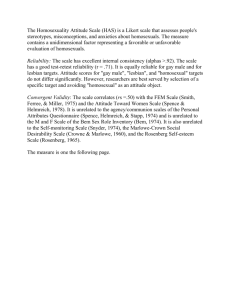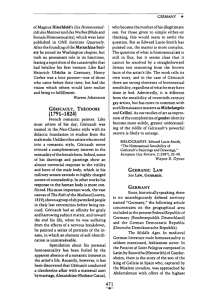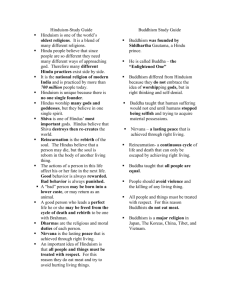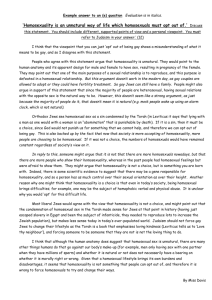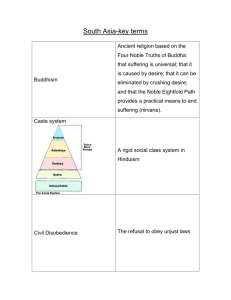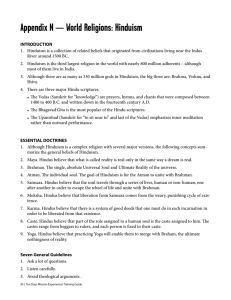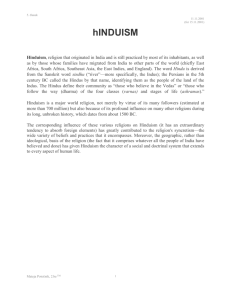Hinduism and Homosexuality Each soul is potentially divine. The
advertisement
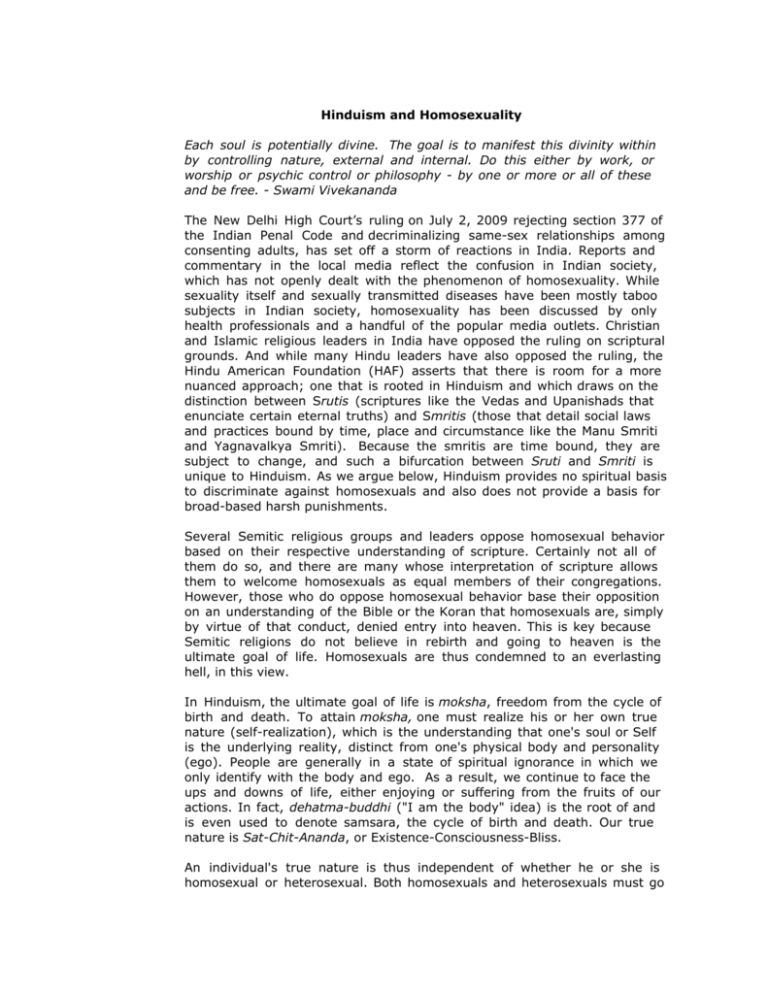
Hinduism and Homosexuality Each soul is potentially divine. The goal is to manifest this divinity within by controlling nature, external and internal. Do this either by work, or worship or psychic control or philosophy - by one or more or all of these and be free. - Swami Vivekananda The New Delhi High Court’s ruling on July 2, 2009 rejecting section 377 of the Indian Penal Code and decriminalizing same-sex relationships among consenting adults, has set off a storm of reactions in India. Reports and commentary in the local media reflect the confusion in Indian society, which has not openly dealt with the phenomenon of homosexuality. While sexuality itself and sexually transmitted diseases have been mostly taboo subjects in Indian society, homosexuality has been discussed by only health professionals and a handful of the popular media outlets. Christian and Islamic religious leaders in India have opposed the ruling on scriptural grounds. And while many Hindu leaders have also opposed the ruling, the Hindu American Foundation (HAF) asserts that there is room for a more nuanced approach; one that is rooted in Hinduism and which draws on the distinction between Srutis (scriptures like the Vedas and Upanishads that enunciate certain eternal truths) and Smritis (those that detail social laws and practices bound by time, place and circumstance like the Manu Smriti and Yagnavalkya Smriti). Because the smritis are time bound, they are subject to change, and such a bifurcation between Sruti and Smriti is unique to Hinduism. As we argue below, Hinduism provides no spiritual basis to discriminate against homosexuals and also does not provide a basis for broad-based harsh punishments. Several Semitic religious groups and leaders oppose homosexual behavior based on their respective understanding of scripture. Certainly not all of them do so, and there are many whose interpretation of scripture allows them to welcome homosexuals as equal members of their congregations. However, those who do oppose homosexual behavior base their opposition on an understanding of the Bible or the Koran that homosexuals are, simply by virtue of that conduct, denied entry into heaven. This is key because Semitic religions do not believe in rebirth and going to heaven is the ultimate goal of life. Homosexuals are thus condemned to an everlasting hell, in this view. In Hinduism, the ultimate goal of life is moksha, freedom from the cycle of birth and death. To attain moksha, one must realize his or her own true nature (self-realization), which is the understanding that one's soul or Self is the underlying reality, distinct from one's physical body and personality (ego). People are generally in a state of spiritual ignorance in which we only identify with the body and ego. As a result, we continue to face the ups and downs of life, either enjoying or suffering from the fruits of our actions. In fact, dehatma-buddhi ("I am the body" idea) is the root of and is even used to denote samsara, the cycle of birth and death. Our true nature is Sat-Chit-Ananda, or Existence-Consciousness-Bliss. An individual's true nature is thus independent of whether he or she is homosexual or heterosexual. Both homosexuals and heterosexuals must go through the same process of self-realization, which includes transcending sexual impulses. To put it provocatively, a homosexual person who has mastered his or her sexual impulses is actually closer to moksha than a heterosexual person who is a slave to sexual desires. Thus homosexual behavior in and of itself does not make one ineligible for moksha. It would, however, be disingenuous to claim that Indian society, which is largely Hindu, will have no issues with laws that legalize gay marriage. Indeed, there seems to be opposition to even decriminalizing such relationships. However, the Smritis and the Puranas are inconsistent on this issue. Professor Arvind Sharma, a well known Hindu academic and Birks Chair of Comparative Religion at McGill University in Montreal, Canada, states in his essay on Homosexuality and Hinduism[i]: “It appears from the foregoing account that, save for the emphasis on renunciation, Hinduism is a sex-positive religion in relation to all the (other) three ends of human life – dharma, artha, kama…. This should not be taken to mean, however, that it also views homosexuality within the general field of sex in a positive light. Dharma and Artha literature is somewhat opposed to it; Kama literature is not opposed to it but is not markedly supportive either. In any case, it is constrained by Dharma values.” The degree of opposition varies by text and those that do prescribe punishments are very context-specific. Thus, not only are Smritis subject to change but there also appear to be no broad-based, harsh punishments advocated for homosexual activity in the ancient smritis. On the whole, ancient India seems to have largely ignored the phenomenon rather than actively persecute homosexuals with harsh punishment. Prof. Sharma also acknowledges, as do we, that the attitude of Hindu society is markedly different from the religion and conjectures that historical reasons, including invasions by foreign religions have contributed to shaping society's attitudes. Thus, “…medieval and modern Hinduism tends to associate the practice with an outgroup with whom its encounter has not been pleasant or peaceful...”[ii]. Indeed, section 377 itself was a creation of the British and of their beliefs at the time, although Indian society of the day likely also disapproved of homosexuality. Beyond de-criminalization, other issues such as legalizing gay marriage are bound to arise in future, and pose more complex questions. The Saptapadi, a key marriage ritual, does explicitly mention procreation. And the issue of marriage gives rise to several other issues, most of which have no religious basis by themselves. This includes employment benefits for partners of homosexuals, differences in tax and insurance rates, discrimination in employment, housing, hotels, hospital visitations, property inheritance, and many more. HAF certainly does not presume to dictate what Hindus should follow. However, as Hindus grapple with a social response to homosexuality, HAF firmly believes that any discussion of the social aspects of homosexuality must consider the following: first, unlike Christianity or Islam, Hinduism does not provide a fundamental spiritual reason to reject or ostracize homosexuals; secondly, we need to work with the latest scientific and medical conclusions that homosexual orientation occurs naturally in a small percentage of most life forms and is not acquired; thirdly, Hinduism has wisely separated the spiritual from the social and allows for Smritis to change over time; and finally, given their inherent spiritual equality, Hindus should not socially ostracize homosexuals, but should accept them as fellow sojourners on the path to moksha. At HAF, we believe that it is important for Hindu leaders, both religious and lay persons, to work within our Sruti/Smriti framework to evolve a uniquely Hindu perspective on this issue rather than follow existing social mores blindly and end up aping the Semitic religions, something Hindus are often accused of doing. We feel comfortable anchoring ourselves to the eternal truths of our religion and letting social practices change with time as they indeed have on so many other matters. [i] See Sharma, Arvind. Homosexuality and Hinduism. In: Arlene Swindler. Homosexuality and World Religions. Valley Forge, PA: Trinity Press International; 1993: 47- 80. [ii] Id. Note: Section 377 was mistakenly attributed to the Indian Constitution. It is part of the Indian Penal Code.

